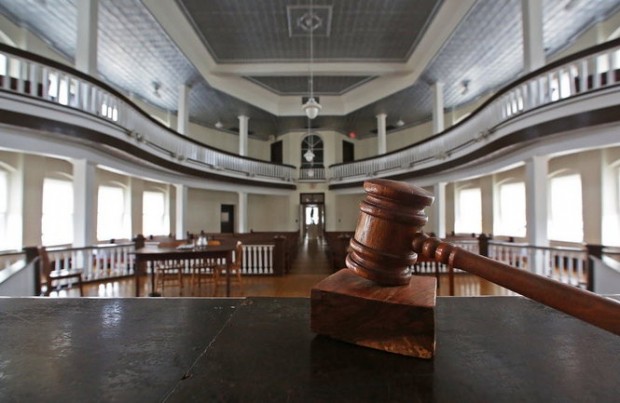A voting rights lawsuit filed Wednesday seeks to do away with the at-large elections of judges who sit on Alabama’s three appellate courts, including the Alabama Supreme Court.
The at-large election system has been racially discriminatory towards African Americans, who make up more than a quarter of the state’s population, according to the lawsuit that suggests election by single-member districts.
As a result of the at-large voting for the judges and justices, no African American has ever served on the state’s criminal and civil appellate courts and only three on the nine-member Alabama Supreme Court in the past 36 years, the lawsuit states,
The at-large method “unlawfully dilutes the voting strength of African Americans and prevents them from electing candidates of their choice,” the lawsuit states.
The lawsuit asks a federal judge to declare that the use of at-large elections for the three appellate courts violates Section 2 of the Voting Rights Act, halt the further use of at-large elections for those courts, and to require future elections for those courts to be conducted under a method of election that complies with the Constitution of the United States and the Voting Rights Act.
The lawsuit suggests several district methods – dividing the state into five districts for the state’s criminal and civil courts of appeals and either nine or eight district plans for the nine-member Alabama Supreme Court.
Under an eight district plan, eight associate judges would be elected by district with the chief justice elected at-large statewide.
As a result of the at-large election method no African American has won an election to any of the three courts in the past 21 years and no African American has served on those appellate courts for the past 15 years, according to the lawsuit.
An African American has never served on either the Court of Criminal Appeals or the Court of Civil Appeals, the lawsuit states.
Three African Americans have served on the Alabama Supreme Court: Oscar Adams, appointed by the governor 1980 and who won election in 1982 and re-election in 1988; Ralph Cook, who was appointed to replace Adams and who was elected to a full six-year term in 1994; and John England, Jr. who was appointed in 1999. England and Cook lost in the 2000 elections.
“Approximately one-quarter of Alabama’s population is African-American. African Americans have been prevented from participating fully in the election of Alabama’s appellate judges because of the way those judges are elected,” the lawsuit states.
Voting in Alabama is racially polarized and the state has had a well-documented history of voting discrimination, the lawsuit states.
“At different points in its history, Alabama utilized poll taxes, literacy tests, and discriminatory redistricting methods to restrict African Americans’ access to the franchise,” the lawsuit states. “A brutal attack on peaceful voting rights marchers at the Edmund Pettus Bridge in Selma, Alabama, on March 7, 1965, moved President Lyndon Johnson to propose the Voting Rights Act eight days later and to sign the Act just five months later.”
The lawsuit also notes the significance of the cases the three appellate courts hear.
“Together, the three courts render enormously consequential decisions that profoundly affect the lives of all Alabamians,” according to the lawsuit.
Nearly 63 percent of Alabama’s prison population is black, lawyers for the plaintiffs say.
The plaintiffs are the Alabama State Conference of the NAACP, and four African American residents and registered voters around Alabama: Sherman Norfleet, of Perry County; Clarence Muhammad, of Jefferson County; the Rev. Curtis Travis, of Tuscaloosa County; and John Harris, of Lee County.
“The Alabama NAACP continues to fight for equitable representation of all communities in our judicial system at all levels,” Benard Simelton, president of the Alabama NAACP, stated in a press release Wednesday. “Alabama cannot continue to have a system that ignores segments of the community. We believe that a revised method of electing judges will lead to representation of all segments of the community.”
The lawsuit was filed in federal court in Montgomery by the Lawyers’ Committee for Civil Rights Under Law in partnership with Alabama civil rights attorneys James Blacksher and Edward Still, Montgomery-based attorney J. Mitch McGuire, and with pro bono lawyers at Crowell & Moring LLP, and the firm Stroock & Stroock & Lavan LLP.
“In 2016, Alabama’s appellate courts are no more diverse than they were when the Voting Rights Act was signed more than 50 years ago,” Kristen Clarke, president and executive director of the Lawyers’ Committee stated in a press release. “It is time for the highest courts in the state of Alabama to reflect the diversity of the communities they serve. This lawsuit seeks to provide African-American voters an equal opportunity to elect judges of their choice, achieve long overdue compliance with the Voting Rights Act and instill greater public confidence in the justice system of Alabama.”
Clarke also said during a teleconference with reporters that the lawuit makes clear that “voting discrimination is alive and well in Alabama.”
Still stated that jurors are supposed to represent all of the adult population, “yet the state uses a system of electing appellate judges that insures those judges come from only part of the population.”
Blacksher said in the telephone press conference this morning that Alabama is one of seven states that elect judges to their highest courts in partisan (multi-party) elections. Of those, five states elect at-large, he said.
If the lawsuit ended quickly in the plaintiffs favor, changes realistically couldn’t come in time to affect this year’s election of four judges on those courts, Blacksher said. The next election is in 2018 but Blacksher didn’t rule out the possibility of mid-term elections.
“The fact that no African Americans are on the Alabama Supreme Court or any other office elected statewide sends a clear message that black Alabamians remain subordinate to whites in state government, just as the 1901 Constitution intended,” Blacksher said in a statement also issued Wednesday morning.
Source: www.al.com





Be the first to comment on "Lawsuit: Current Election System of Alabama Appellate Judges Discriminates Against Blacks"